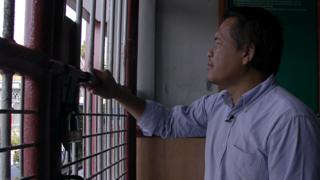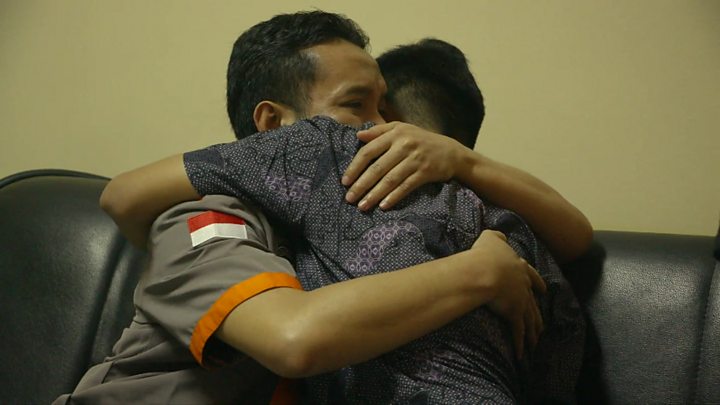
Ali Fauzi is now helping others turn their backs on extremism and intolerance.
Ali Fauzi was an essential member of Jemaah Islamiyah, a militant group with links to al-Qaeda, which was responsible for Indonesia’s worst attack – the 2002 Bali bombing that killed more than 200 individuals.
” My bros carried out the Bali battle.
” The truth is that it is much easier to recruit people to terrorist groups,” he says.
” We saw videos of the ruthless attacks on civilians.
While his siblings went to fight along with the mujahideen, in Afghanistan, Ali Fauzi remained closer to home, joining Islamic militants battling for a Muslim homeland in the southern Philippines.
” I truly wanted to pass away there.
Image copyright
Getty Images
The 2002 battles killed 202 people.
When his brothers returned from Afghanistan, they put into practice what they had actually learnt abroad.
In October 2002, they were amongst a group that detonated 2 bombs targeting nightclubs in the Kuta area of Bali, the island popular with international travelers.
” I saw it on TV and I was stunned, there were a lot of dead bodies,” says Ali Fauzi. “It led the authorities right to us.”
2 of his brothers, Ali Ghufron and Amrozi, were performed while his third, Ali Imron, is behind bars for life.
Ali Fauzi, who insists he was not involved in the Bali bombing, spent 3 years in jail for other terror-related offenses. That’s when his life took on a considerably new instructions.
” Police treated me really humanely. If they had tortured me then possibly 7 generations after me would be fighting the Indonesian government,” he states.
” I disliked the cops, we thought of them as Satan. That’s what we were taught. However the reality was completely different. That’s when my entire perspective entirely changed.”
He likewise satisfied victims of bombings his group had actually carried out.
” I sobbed. My heart melted, seeing the dreadful result our bombs had. That’s what made me truly want to alter from a representative of war to end up being a warrior for peace.”

Media playback is unsupported on your device
As the evening call to prayer rings out throughout the Tenggulun town, prayer mats are presented in a square at the side of the town’s primary mosque. They are just beside the office of Circle of Peace, the structure Ali Fauzi established in 2016 to divert individuals far from extremism.
The prayer event tonight is led by 2 bomb victims, visitors of honour in this town which was when the base camp for the militant groups that performed the attacks that ruined their lives.
” I often bring victims to the neighborhood,” Ali Fauzi states, “as meeting them was the thing that destroyed my ego.”
On the screen on the side of the stage a graphic video reveals the after-effects of all the bombs in Indonesia.
It’s an amazing meeting. In the audience are cops who arrested members of this community, along with those who have actually served time in jail on terrorism offences.
They are listening to the victims of the bombing talk, through tears, about the pain they have suffered.
In the audience is 33- year-old Zulia Mahendra. He was a teen when his dad, Amrozi, was arrested, sentenced to death and after that later on executed for the Bali bombing.
Amrozi was called the “smiling assassin” by the media since he showed no remorse during the trial, grinning throughout and bold to his death.
Crossing divides
A season of stories about bringing individuals together in a fragmented world.
After the conference, Mahendra greets the 2 bomb victims.
” I want to state sorry, not since I am wrong.
Zulia Mahendra was 16 when his dad was detained and then later on performed for the Bali battle.
Mahendra, too, has actually gone through an impressive improvement.
” When my dad was performed, I desired revenge. I wished to find out how to make bombs too,” he admits.
” But with time and with guidance from my uncles – Ali Fauzi and Ali Imron – they made me understand it was the incorrect thing to do. And I joined their project to help other terrorists alter.”
Zulia Mahendra with his child.
One night, Mahendra says, he looked tearfully at his sleeping kid and believed about his dad.
” I didn’t want my kid to have to go through what I have.
But he states he has friends who have signed up with splinter militant groups in Indonesia, loosely linked to the Islamic State (IS) group.
” My deradicalisation work is not based on theory.
But he deals with resistance and is seen by some as a traitor for working with the police.
” They say that I am even more of a kafir [unbeliever] than the police or jail guards.
” Out of the 98 people we have worked with given that 2016, 2 have come out of prison and gone directly back to their militant ways.”
” Deradicalisation is not easy since you are dealing with individuals’s emotions and point of view, you have to give them the best medicine. And often we get it incorrect.”
Sometimes they get it right.
Sumarno, he says, is among his success stories.
He takes me to a dry field, at the side of the road outside the town. It was here that Sumarno says he concealed weapons coming from Jemaah Islamiyah, after the Bali battle.
Sumarno points to where he hide weapons after the 2002 Bali bombings.
” Now I want to offer back to society,” says Sumarno.
Sitting in his wise air-conditioned workplace in Paciran, a 20- minute drive from the village, he states he was anxious at very first about telling his clients about his violent past, even careful not to say which town he was from.
But now he starts the trip with what he calls his story of redemption.
In a room at the side of the town mosque, an after-school club takes place. Kids dressed in vibrant clothing recite the Koran.
A few of their moms and dads lag bars on terrorism charges.
The teachers consist of Ali Fauzi’s partner, Lulu, and Zumrottin Nisa, who is married to Ali Imron.
” We stress to them that not everybody thinks the very same thing,” states Lulu.
” That there are people in our community who are non-Muslim and we have to treat them with respect as long as they don’t attempt to hinder our faith.”
However she states they have not convinced everyone.
” There are those for and versus our brand-new objective. Those that are still militant don’t like us now. They stay away from us,” she states.
” We used to be one group with the same mission but we changed after the Bali battle killed so many innocent people, much of them Muslims. There are others who have not altered.”
In May last year, a household of suicide bombers assaulted 3 churches in East Java.
The father pursued one, his teenage sons went after another, and his partner and 2 daughters, age 12 and nine, blew themselves up at the third.
The enemies belonged to the Jamaah Ansharut Daulah (JAD) network, which is loosely linked to IS.
JAD has actually carried out a series of lone wolf attacks versus Indonesian security forces and spiritual minorities. The most current was a knife attack, by a young couple, versus the nation’s top gatekeeper, Wiranto.
Lulu Fauzi.
In the Circle of Peace workplace, Lulu Fauzi states she is surprised ladies are taking such an active part.
” My partner is working hard to make certain previous terrorism inmates do not return. He is bringing them together and he has had the ability to reverse many individuals.
” But lots of people are still radical. We can never ever actually clean it out,” she says.
As we drive through the village, Ali Fauzi’s phone is constantly sounding.
He takes a call from someone who has actually just recently been launched, having actually served time on terrorism charges. The individual requires assistance getting real estate.
Another call is from a mom whose child is being questioned by the cops.
” Lots of people from our neighborhood went to combat with the Islamic State in Syria and Iraq,” he says. “Recently, a member of IS was detained by the cops here. So militant groups still exist and they still threaten Indonesia.”
Now he’s on the side of what he refers to as a fight against extremism and intolerance.
” If we strive and include the entire neighborhood, then I am still enthusiastic that we can win this war.”
BBC News.

